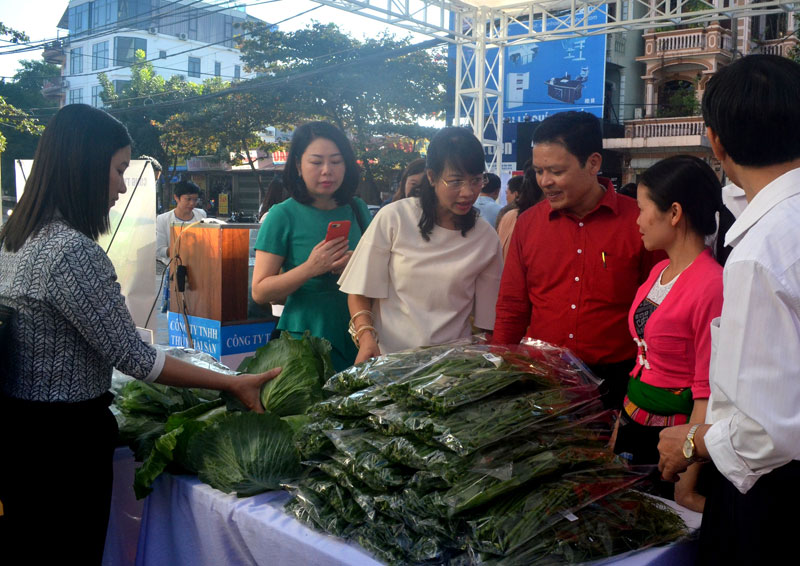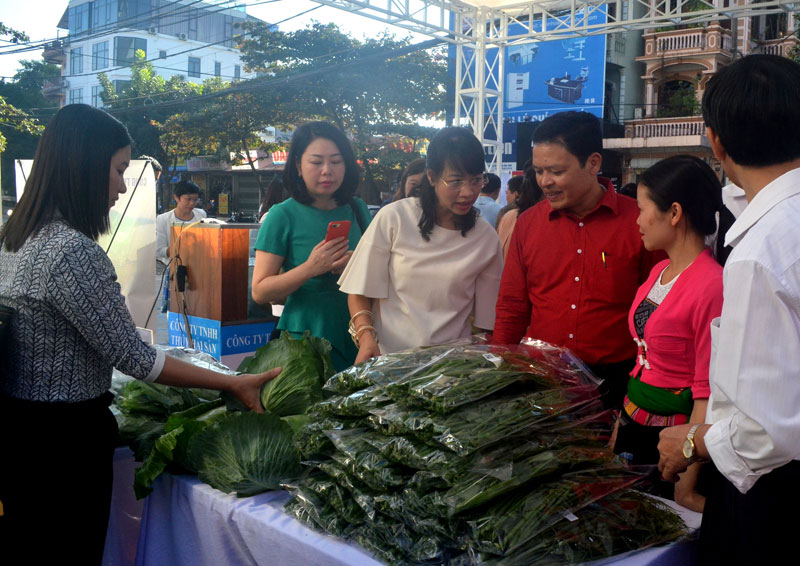
(HBO) - Many specialities of Hoa Binh have reached the market and captured the trust of consumers thanks to their excellent quality and brand value.
Tan Lac district is famous for such specialties
as Tan Lac red pomelo, Phu Vinh purple sugarcane and Quyet Chien chayote
vegetable.
This is considered one of the most prominent achievements of the local
authority, showing the determination of the Party Committee, authority and
people of Tan Lac district after 10 years
of the implementation of Resolution No. 21 of the The 10th Party Central Committee (Resolution No. 21) on perfecting the socialist-oriented
market economy institution.

Giang Vo fair in Hanoi features
agricultural products.
Adhering to the policies and plans adopted,
the Tan Lac district People's Committee has devised many measures to support production
development, focusing on producing products of the locality’s strength; and help
locals access preferential loans, thus making it easy for individuals,
organizations, enterprises and cooperatives to expand production.
Over the past 10 years, the
district has set up and converted 25 cooperatives, which are operating under the Law of Cooperative in 2012.
According to the committee, along with the economic field, the district has also achieved outstandingachievements in poverty reduction and social security after 10 years of the implementation of Resolution No. 21.
In the period, the district authority
upheld the strength of the whole political system and the community to invest
in improving infrastructure systems; supporting poor households in building houses
and accessing capital sources for production development.
Attention was also paid to helping people
in disadvantaged areas and social welfare beneficiaries access basic social
services, thus improving their living conditions.
Statistics show that the rate of poor
households in the district decreases by 2-3 percent per year, to 22.3 percent
while the total average production value increases by 13.5 percent per year, with
the economic structure has been shifted positively.
Per capita income in 2018 is estimated at 38.46 million VND, the state budget
revenue is hoped to increase by 15 percent per year.
The spiritual life of locals is increasingly improved, while their material
life is also much better. /.
According to data from the Hoa Binh Provincial Party Committee, the industrial production index for the first six months of 2025 is estimated to have increased by 20% compared to the same period last year. This marks the highest year-on-year growth rate for this period since 2020.
In the first six months of 2025, Hoa Binh province’s export turnover was estimated at 1.145 billion USD, marking an 18.11% increase compared to the same period in 2024. Import turnover was estimated at $ 804 million, a 17.15% increase, which helped the province maintain a positive trade balance.
The lives of the ethnic minority farmers in Tan Lac district have gradually improved thanks to the new directions in agricultural production. This is a testament to the collective strength fostered through the professional associations and groups implemented by various levels of the district’s Farmers’ Union.
With the motto the "product quality comes first,” after nearly one year of establishment and operation, Muong village’s Clean Food Agricultural and Commercial Cooperative, located in Cau Hamlet, Hung Son Commune (Kim Boi district), has launched reputable, high-quality agricultural products to the market that are well-received by consumers. The products such as Muong village’s pork sausage, salt-cured chicken, and salt-cured pork hocks have gradually carved out a place in the market and they are on the path to obtaining the OCOP certification.
In the past, the phrase "bumper harvest, rock-bottom prices" was a familiar refrain for Vietnamese farmers engaged in fragmented, small-scale agriculture. But today, a new spirit is emerging across rural areas of Hoa Binh province - one of collaboration, organisation, and collective economic models that provide a stable foundation for production.
Maintaining growing area codes and packing facility codes in accordance with regulations is a mandatory requirement for agricultural products to be eligible for export. Recently, the Department of Agriculture and Environment of Hoa Binh province has intensified technical supervision of designated farming areas and packing facilities to safeguard the "green passport" that enables its products to access international markets.



